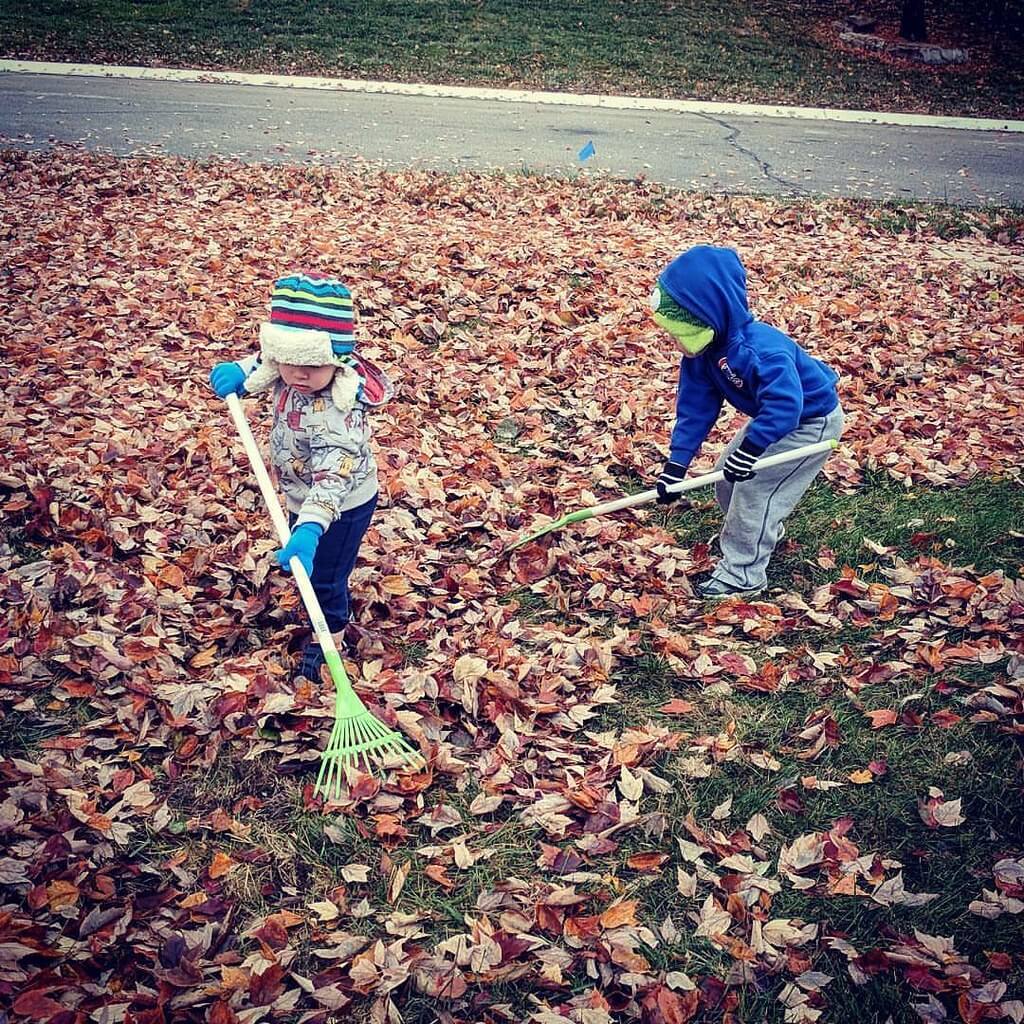
Fall garden tasks should include raking leaves off your lawn. Leaves make great mulch for your garden beds. Larry Koester, Flickr.
Now that the rains and cooler weather have returned, it’s time to take care of some fall garden tasks. Work that you do now will help make your plants healthier and your yard easier to care for next year. In Harmony can also help you in this process.
Here are some important fall garden tasks to take care of.
Fall garden tasks: clean up leaves
Rake leaves off your lawn. Leaves, especially wet leaves, can thin your lawn in a very short time. Fallen leaves smother the grass. This prevents water from evaporating and eliminates air exchange. The combination of wet plants and low oxygen can cause fungus, mold and disease. It essentially rots your lawn.
Rake or blow leaves off your lawn at least once a week during peak leaf fall. Dry leaves are easier to rake than wet ones, so aim for a dry day if possible (not always easy in November weather). Using a good rake makes the job easier.
You can rake leaves into your garden beds for mulch. You could also add leaves to your compost pile. Composted leaves make great soil amendments.
Some leaves may carry diseases. Rake and remove leaves from under your rose bushes and other trees or shrubs that are prone to disease, such as fruit trees, ornamental cherries and plums, and dogwoods.
Removing leaves will help reduce fungal diseases, like black spot and powdery mildew, next year. Do not compost these leaves. Put them in yard waste bins for pickup.
Fall garden tasks: add mulch
Leaves make a great mulch for your garden beds. Just rake them onto the beds and spread them out in a thick layer.
Or use other organic mulch, such as compost or arborist chips. Mulch will make it harder for weeds to sprout. Mulch will also protect the soil and plants from winter weather.
With either leaves or mulch, make sure to leave a ring that’s several inches wide around the trunks of your trees and shrubs. Do not pile it against the trunk.
Read more about mulch and watch a video about types of mulch in our blog post. Read more about arborist chips. Contact us if you would like us to apply mulch for you.
Fall garden tasks: clean up weeds
Pull weeds that have sprouted in your garden beds. In western Washington, we have a number of weed species that sprout and grow during the winter.
It is best to pull weeds when they are small, before they can grow and set seed. If you have existing weeds that have already matured and set seed, remove and dispose of them carefully. Weeds left in the garden will go to seed, producing hundreds of new weeds next year.
Clean up your garden, but don’t go overboard
Remove fallen fruit and any fruit remaining on the tree. This will keep insects from overwintering and causing problems next spring. Dispose of fruit.
Pull vegetable plants that are no longer bearing. Make sure to remove tomato plants to reduce late blight problems. Healthy material can go in a compost bin if you have one. If you suspect disease, dispose of the material in the yard waste bin at the curb.
Leave some plant debris for beneficial insects. Dead plant stems, dried seed pods and faded ornamental grasses provide homes for pollinators and other beneficial insects such as native bees, spiders, ladybugs and beetles. These insects may also rely on logs, brush piles or dead ground cover to winter in. Birds may eat seeds and insects. But remove seed heads on perennials that readily self-sow.
Local, native plants are especially important to keep, as they are most likely to provide food for local wildlife. Read more about how beneficial insects benefit from not cleaning up your garden.
Leave some dead plants for winter interest. The winter garden provides more visual interest if it hasn’t been cut to the ground. Dead stems lend height, and some seed pods have a sculptural quality.
Pick up debris such as boards or bricks. They provide great shelter for slugs, snails and other garden pests.
Do cleanup pruning as needed
Prune dead, diseased and overlapping branches on your trees and shrubs in late fall. This will create strong structure and minimize the potential for winter storm damage. Contact us if you would like to get on our pruning schedule.
Take care of your tools and equipment
Clean soil off your garden tools. If they are starting to rust, buff the rust spots with sandpaper. Apply a thin film of oil, such as vegetable oil or linseed oil, to metal tools and wooden handles before storing them.
Clean and sharpen pruners and mower blades. Sharp tools provide cleaner cuts, helping keep plants healthy.
Drain water from hoses and drip irrigation systems.
In Harmony will help improve your garden health
We are currently doing fall visits for lawn, tree and shrub care.
We may apply effective microorganisms to build soil health. Watch our short video to find out about effective microorganisms and how they will help your garden be healthier next year.
We may also apply dormant oils to kill unwanted insects and mites that overwinter on trees and shrubs, such as scales, mites, codling moths, aphids and other soft-bodied pests.
Dormant oils kill these troublesome pests by smothering them. They have a low toxicity to humans, birds, beneficial insects and animals. Read more about dormant oils in this blog post.
Find out more about our natural lawn, tree and shrub care services. And contact us if you are interested in signing up for our services.
Read more about fall garden tasks
How to rake leaves (almost effortlessly), Chicago Tribune.
The Gardener’s Guide to Plant Diseases. by Barbara Pleasant.
Garden Clean-up and other October Gardening Tips, University of Vermont Extension.
Cleaning Up the Garden for Winter—Fall and Winter Garden Care, Homestead.org.

Trackbacks/Pingbacks